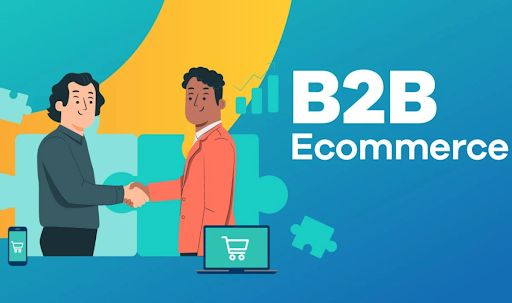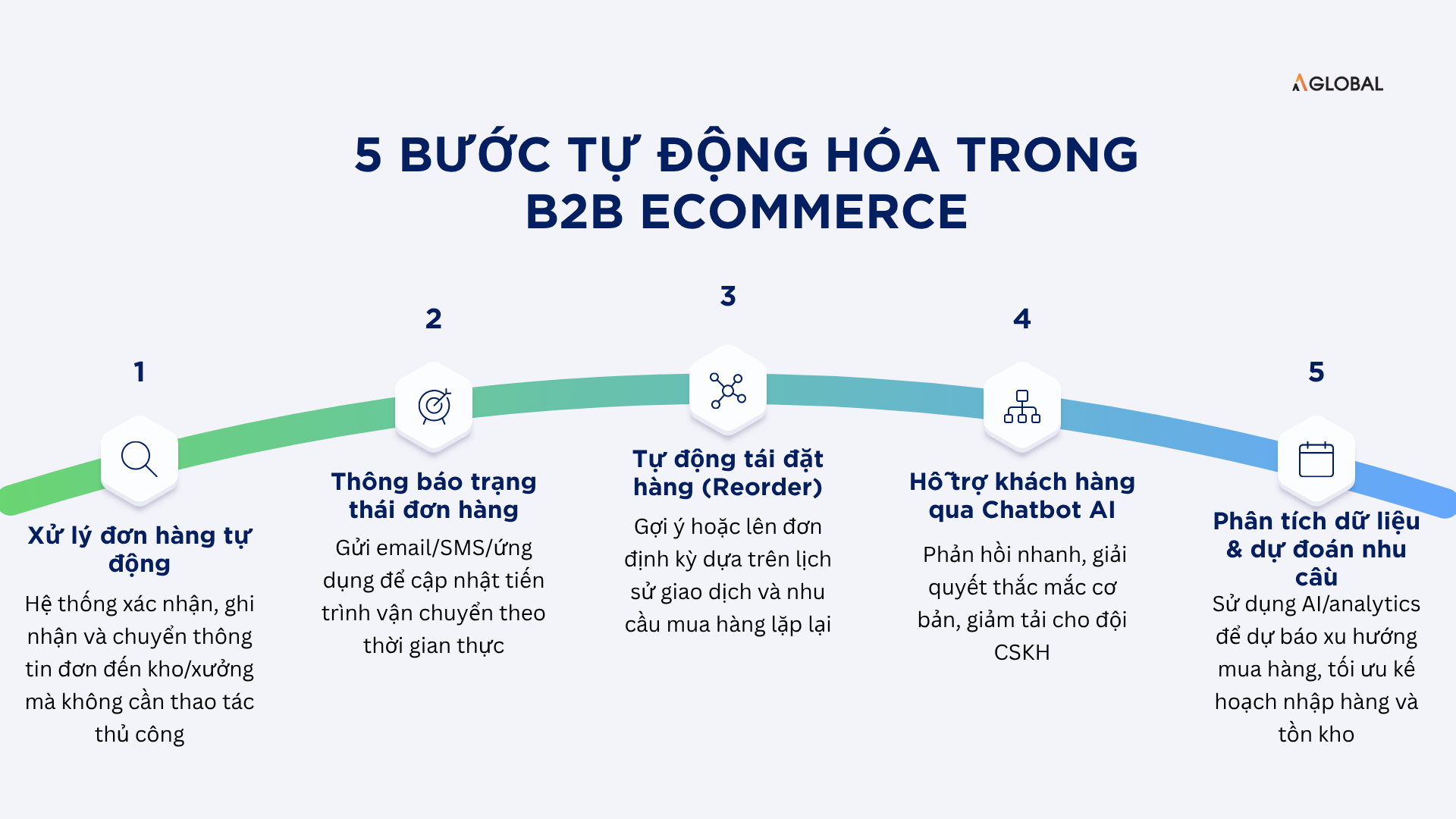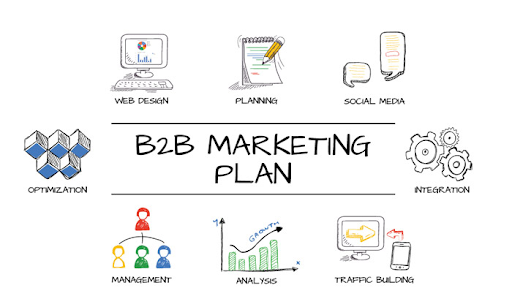
B2B Ecommerce Trends 2025: Leading the Future of Business
B2B Ecommerce is not only a global commerce trend but also a turning point that helps Vietnamese businesses expand markets and achieve sustainable growth. So, what is B2B Ecommerce, and why is it increasingly becoming an inevitable trend? What do businesses need to prepare, and what role does a B2B Ecommerce Agency play in the digital transformation journey?
1. Overview of B2B Ecommerce
In the context of a rapidly growing digital economy, B2B Ecommerce is no longer just a trend; it has become a key business model connecting companies worldwide.
1.1. What is B2B Ecommerce?
B2B Ecommerce (Business-to-Business Ecommerce) is a form of e-commerce where businesses market, sell, and transact online with other businesses. Unlike B2C, which targets individual consumers, B2B Ecommerce focuses on serving organizational clients, companies, wholesalers, or distributors.
Nowadays, B2B Ecommerce is no longer merely a platform for receiving bulk orders. It has become a strategic revenue channel, helping businesses expand their global customer base, optimize operational costs, and enhance long-term collaboration efficiency.

A typical example is Amazon, where businesses can trade online, place large orders, manage invoices, and track shipments - an illustrative case of how B2B Ecommerce operates in practice.
1.2. Outstanding features of B2B Ecommerce
Compared to B2C ecommerce, the B2B ecommerce model has its own characteristics, reflecting the complexity and scale of business-to-business transactions:
- Customers: Mainly businesses, organizations, or distributors.
- Transaction scale: Large orders, high value, often associated with long-term contracts.
- Collaborative relationships: Focused on long-term, sustainable partnerships.
- Professional requirements: Detailed and transparent product information, processes, and standards.
- Distribution channels: Combination of direct from manufacturers and via B2B e-commerce platforms.
- Technology application: Integration of data management, process automation, global payment, and logistics
2. Current trends of B2B Ecommerce
In 2025, B2B Ecommerce is evolving rapidly alongside technological development and global market fluctuations.
2.1. Vietnam becomes a new production hub in the region
Vietnam is emerging as a bright spot in the global supply chain, especially in the Asia-Pacific region. With competitive production costs, abundant labor, and government support policies, Vietnamese businesses are attracting growing attention from international buyers.
According to statistics from the Ministry of Industry and Trade, in 2023, the export value through Vietnam’s e-commerce channels reached nearly USD 5 billion, up 25% from the previous year. This growth shows that Vietnam is not only a “new workshop” but also a strategic link in the global production network, particularly as multinational corporations relocate supply chains.
2.2. Key industries and distinctive products thriving on B2B Ecommerce platforms
Many Vietnamese sectors are making strong impressions on B2B Ecommerce platforms, notably: Fashion & accessories, household goods, sports & recreation, footwear, and food & beverages.
Additionally, handicraft products from rattan, coconut wood, to recycled rice husk items are becoming Vietnamese businesses’ “unique advantage” in the international market. These products not only represent goods but also carry stories of culture, sustainability, and social responsibility, aligning with the global trend of eco-friendly and distinctive products.

2.3. Challenges and solutions for Vietnamese SMEs
Despite huge potential, Vietnamese SMEs still face barriers in participating in B2B, including limited operational skills, language issues, cross-border logistics, and digital marketing strategies.
A survey by VECOM (Vietnam E-commerce Association) shows that only 15% of small businesses have a dedicated e-commerce team, while over 50% reported “serious difficulties” in implementing digital export channels. This highlights the challenges in effectively tapping into international markets.
To help SMEs overcome these barriers, major e-commerce platforms like Amazon continuously develop comprehensive solutions, from automatic translation to secure payment and international logistics.
Furthermore, intermediaries providing end-to-end cross-border e-commerce solutions, such as AGlobal, have become important bridges, accompanying Vietnamese businesses in building stores, optimizing operations, and expanding their reach to global markets.
3. Success factors for B2B Ecommerce businesses
To achieve sustainable growth on B2B Ecommerce, having a good product alone is not enough. Success also depends on how businesses organize operations, adapt to digital trends, and build a unique market advantage.
3.1. Data management and automation systems
Good data management is the foundation for effective B2B operations. When all information about products, orders, or customers is collected and updated synchronously, businesses can reduce errors, shorten product launch times, and maintain consistent information across channels.
In addition, process automation—such as order processing, order status notifications, reorder management, and customer support via chatbot—also saves labor and time. It supports data analysis to forecast demand and optimize inventory.

Five automation steps in B2B Ecommerce
3.2. Personalizing the business partner experience
In B2B Ecommerce, each business partner often has specific requirements regarding pricing, quantity, delivery methods, and offers. Therefore, personalization should be reflected in product suggestions, custom quotations, and tailored marketing content.
Providing a dedicated management account (dashboard) for partners to track orders, check shipments, invoices, and place orders quickly also ensures transparent, convenient transactions and strengthens trust.
3.3. Optimizing buying and payment processes
If purchasing procedures are cumbersome, customers may quickly lose patience. Businesses need to streamline processes through automated approvals, quick reorders, or integrated reminders.
Simultaneously, payment processes via international transfers, credit cards, or deferred payments offer flexibility and security, increasing convenience and fostering long-term cooperation.
3.4. B2B marketing strategy in the online environment
Marketing on B2B Ecommerce is not only about promoting products but also about building credibility and trust with partners. Quality content such as analysis and case studies helps demonstrate business capabilities. Digital channels like SEO, LinkedIn, email marketing, and advertising help reach the right clients.

Optimizing website and mobile experiences is also a key factor in retaining partners long-term.
Read more: What is B2B Marketing? The A-Z of the B2B customer journey
4. B2B Ecommerce Agency – Solutions for businesses
Not all businesses have the resources and experience to build, operate, and optimize an online store themselves. The emergence of B2B Ecommerce Agencies becomes an important “assistant,” offering comprehensive solutions from strategy, technology to marketing.
4.1. Definition of B2B Ecommerce Agency
A B2B Ecommerce Agency is an entity specializing in consulting, implementing, and managing all e-commerce activities in the business-to-business model (B2B).
In other words, a B2B Ecommerce Agency acts as an intermediary helping businesses build a professional online sales platform, optimize customer experience, and enhance operational efficiency in the digital environment.
4.2. Services and solutions provided by B2B Ecommerce Agencies
B2B Ecommerce Agencies often offer turnkey solutions, including:
- Strategy consulting: Building an online business roadmap tailored to the industry and target market.
- Store & website deployment: Designing, developing, and optimizing professional B2B online sales systems.
- Operational management: Supporting product, order, payment, and logistics management.
- Marketing & branding: Executing promotional campaigns, optimizing SEO/SEM, social media, and multi-channel advertising.
- Analysis & reporting: Providing data, market insights, and improvement recommendations for sustainable growth.
Thanks to these services, businesses can focus on core activities while the agency ensures the entire e-commerce system operates efficiently.
5. Conclusion
B2B Ecommerce is opening a wide gateway for Vietnamese businesses to reach the global market. To seize this opportunity, businesses not only need quality products but also a structured digitalization strategy. Collaborating with a B2B Ecommerce Agency saves time and increases the likelihood of success.
AGlobal – the best cross-border e-commerce solution for businesses.
Sign up for free 1-on-1 consultation tailored to your industry Here!
